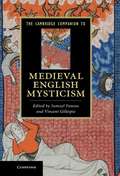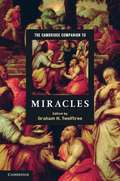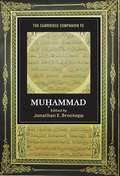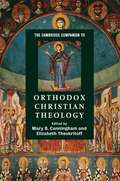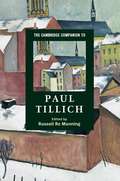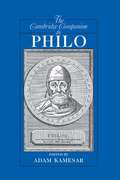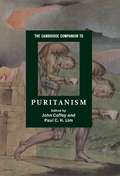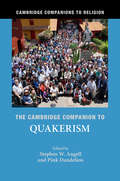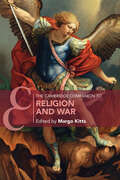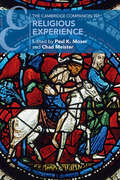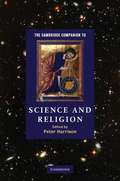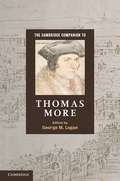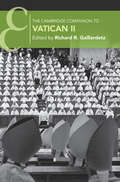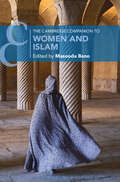- Table View
- List View
The Cambridge Companion to Martin Luther
by Donald K. MckimMartin Luther (1483â "1546) stands as one of the giant figures in history. His activities, writings, and legacy have had a huge effect on the western world. This Cambridge Companion provides an accessible introduction to Martin Luther for students of theology and history and for others interested in the life, work and thought of the first great Protestant reformer. The book contains eighteen chapters by an international array of major Luther scholars. Historians and theologians join here to present a full picture of Luther's contexts, the major themes in his writings, and the ways in which his ideas spread and have continuing importance today. Each chapter serves as a guide to its topic and provides further reading for additional study. The Companion will assist those with little or no background in Luther studies, while teachers and Luther specialists will find this accessible volume an invaluable aid to their work.
The Cambridge Companion to Medieval English Mysticism
by Samuel Fanous Vincent GillespieThe widespread view that 'mystical' activity in the Middle Ages was a rarefied enterprise of a privileged spiritual elite has led to isolation of the medieval 'mystics' into a separate, narrowly defined category. Taking the opposite view, this book shows how individual mystical experience, such as those recorded by Julian of Norwich and Margery Kempe, is rooted in, nourished and framed by the richly distinctive spiritual contexts of the period. Arranged by sections corresponding to historical developments, it explores the primary vernacular texts, their authors, and the contexts that formed the expression and exploration of mystical experiences in medieval England. This is an excellent, insightful introduction to medieval English mystical texts, their authors, readers and communities. Featuring a guide to further reading and a chronology, the Companion offers an accessible overview for students of literature, history and theology.
The Cambridge Companion to Medieval English Theatre
by Richard Beadle Alan J. FletcherThe drama of the English Middle Ages is perennially popular with students and theatre audiences alike, and this is an updated edition of a book which has established itself as a standard guide to the field. The Cambridge Companion to Medieval English Theatre, second edition, continues to provide an authoritative introduction and an up-to-date, illustrated guide to the mystery cycles, morality drama and saints' plays which flourished from the late fourteenth to the mid-sixteenth centuries. The book emphasises regional diversity in the period and engages with the literary and particularly the theatrical values of the plays. Existing chapters have been revised and updated where necessary, and there are three entirely new chapters, including one on the cultural significance of early drama. A thoroughly revised reference section includes a guide to scholarship and criticism, an enlarged classified bibliography and a chronological table.
The Cambridge Companion to Medieval Jewish Philosophy
by Daniel H. Frank Oliver LeamanInfluenced originally by Islamic theological speculation, classical philosophers and Christian Scholasticism of the Middle Ages, Jewish thinkers living in Islamic and Christian lands philosophized about Judaism from the ninth to fifteenth centuries. They reflected on the nature of language about God, the creation of the world, the possibility of human freedom and the relationship between divine and human law. This Companion presents major medieval Jewish thinkers in a comprehensive introduction to a vital period of Jewish intellectual history.
The Cambridge Companion to Miracles
by Graham H. TwelftreeThe miracle stories of the founders and saints of the major world religions have much in common. Written by international experts, this Companion provides an authoritative and comparative study of miracles in not only Hinduism, Islam, Buddhism, Christianity and Judaism, but also, indigenous religions. The authors promote a discussion of the problems of miracles in our largely secular culture, and of the value of miracles in religious belief. The miracles of Jesus are also contextualized through chapters on the Hebrew Bible, classical culture to the Romans, Second Temple and early rabbinic Judaism and early Christianity. This book provides students with a scholarly introduction to miracles, which also covers philosophical, medical and historical issues.
The Cambridge Companion to Modern Jewish Philosophy
by Michael L. Morgan Peter Eli Gordon"The Cambridge Companion to Modern Jewish Philosophy is a collection of original essays that examine the work of some of the most important Jewish thinkers of the modern era - the period extending from the seventeenth century to the late twentieth century. "--BOOK JACKET.
The Cambridge Companion to Muhammad
by Jonathan E. BrockoppAs the Messenger of God, Muhammad stands at the heart of the Islamic religion, revered by Muslims throughout the world. The Cambridge Companion to Muhammad comprises a collection of essays by some of the most accomplished scholars in the field exploring the life and legacy of the Prophet. The book is divided into three sections, the first charting his biography and the milieu into which he was born, the revelation of the Qur'Äun, and his role within the early Muslim community. The second part assesses his legacy as a law-maker, philosopher, and politician and, finally, in the third part, chapters examine how Muhammad has been remembered across history in biography, prose, poetry, and, most recently, in film and fiction. Essays are written to engage and inform students, teachers, and readers coming to the subject for the first time. They will come away with a deeper appreciation of the breadth of the Islamic tradition, of the centrality of the role of the Prophet in that tradition, and, indeed, of what it means to be a Muslim today.
The Cambridge Companion to New Religious Movements
by Olav Hammer Mikael RothsteinNew religions emerge as distinct entities in the religious landscape when innovations are introduced by a charismatic leader or a schismatic group leaves its parent organization. New religious movements (NRMs) often present novel doctrines and advocate unfamiliar modes of behavior, and have therefore often been perceived as controversial. NRMs have, however, in recent years come to be treated in the same way as established religions, that is, as complex cultural phenomena involving myths, rituals and canonical texts. This Companion discusses key features of NRMs from a systematic, comparative perspective, summarizing results of forty years of research. The volume addresses NRMs that have caught media attention, including movements such as Scientology, New Age, the Neopagans, the Sai Baba movement and Jihadist movements active in a post-9/11 context. An essential resource for students of religious studies, the history of religion, sociology, anthropology and the psychology of religion.
The Cambridge Companion to Orthodox Christian Theology
by Mary B. Cunningham Elizabeth TheokritoffOrthodox Christian theology is often presented as the direct inheritor of the doctrine and tradition of the early Church. But continuity with the past is only part of the truth; it would be false to conclude that the eastern section of the Christian Church is in any way static. Orthodoxy, building on its patristic foundations, has blossomed in the modern period. This volume focuses on the way Orthodox theological tradition is understood and lived today. It explores the Orthodox understanding of what theology is: an expression of the Church's life of prayer, both corporate and personal, from which it can never be separated. Besides discussing aspects of doctrine, the book portrays the main figures, themes and developments that have shaped Orthodox thought. There is particular focus on the Russian and Greek traditions, as well as the dynamic but less well-known Antiochian tradition and the Orthodox presence in the West.
The Cambridge Companion to Paul Tillich
by Russell Re ManningThe complex philosophical theology of Paul Tillich (1886-1965), increasingly studied today, was influenced by thinkers as diverse as the Romantics and Existentialists, Hegel and Heidegger. A Lutheran pastor who served as a military chaplain in World War I, he was dismissed from his university post at Frankfurt when the Nazis came to power in 1933, and emigrated to the United States, where he continued his distinguished career. This authoritative Companion provides accessible accounts of the major themes of Tillich's diverse theological writings and draws upon the very best of contemporary Tillich scholarship. Each chapter introduces and evaluates its topic and includes suggestions for further reading. The authors assess Tillich's place in the history of twentieth-century Christian thought as well as his significance for current constructive theology. Of interest to both students and researchers, this Companion reaffirms Tillich as a major figure in today's theological landscape.
The Cambridge Companion to Pentecostalism
by Cecil M. Robeck Amos YongPentecostalism is one of the fastest-growing religious movements in the world. Groups in the United States dominated early Pentecostal histories, but recent global manifestations have expanded and complicated the definition of Pentecostalism. This volume provides a nuanced overview of Pentecostalism's various manifestations and explores what it means to be Pentecostal from the perspectives of both insiders and outsiders. Leading scholars in the field use a multidisciplinary approach to analyze the historical, economic, political, anthropological, sociological, and theological aspects of the movement. They address controversies, such as the Oneness-Trinity controversy; introduce new theories; and chart trajectories for future research. The Cambridge Companion to Pentecostalism will enable beginners to familiarize themselves with the important issues and debates surrounding the global movement, while also offering experienced scholars a valuable handbook for reference.
The Cambridge Companion to Philo (Cambridge Companions to Philosophy)
by Adam KamesarThe works of Philo of Alexandria, a slightly older contemporary of Jesus and Paul, constitute an essential source for the study of Judaism and the rise of Christianity. They are also of extreme importance for understanding the Greek philosophy of the time and help to explain the onset of new forms of spirituality that would dominate the following centuries. This 2009 handbook presents an account of Philo's achievements. It contains a profile of his life and times, a systematic overview of his many writings, and survey chapters of the key features of his thought, as seen from the perspectives of Judaism and Greek philosophy. The volume concludes with a section devoted to Philo's influence and significance. Composed by an international team of experts, The Cambridge Companion to Philo gives readers a sense of the state of scholarship and provides depth of vision in key areas of Philonic studies.
The Cambridge Companion to Postmodern Theology
by Kevin J. VanhoozerPostmodernity allows for no absolutes and no essence. Yet theology is concerned with the absolute, the essential. How then does theology sit within postmodernity? Is postmodern theology possible, or is such a concept a contradiction in terms? Should theology bother about postmodernism or just get on with its own thing? Can it? Theologians have responded in many different ways to the challenges posed by theories of postmodernity. In this introductory 2003 guide to a complex area, editor Kevin J. Vanhoozer addresses the issue head on in a lively survey of what 'talk about God' might mean in a postmodern age, and vice versa. The book then offers examples of different types of contemporary theology in relation to postmodernity, while the second part examines the key Christian doctrines in postmodern perspective. Leading theologians contribute to this clear and informative Companion, which no student of theology should be without.
The Cambridge Companion to Puritanism
by John Coffey Paul C. H. Lim'Puritan' was originally a term of contempt, and 'Puritanism' has often been stereotyped by critics and admirers alike. As a distinctive and particularly intense variety of early modern Reformed Protestantism, it was a product of acute tensions within the post-Reformation Church of England. But it was never monolithic or purely oppositional, and its impact reverberated far beyond seventeenth-century England and New England. This Companion broadens our understanding of Puritanism, showing how students and scholars might engage with it from new angles and uncover the surprising diversity that fermented beneath its surface. The book explores issues of gender, literature, politics and popular culture in addition to addressing the Puritans' core concerns such as theology and devotional praxis, and coverage extends to Irish, Welsh, Scottish and European versions of Puritanism as well as to English and American practice. It challenges readers to re-evaluate this crucial tradition within its wider social, cultural, political and religious contexts.
The Cambridge Companion to Quakerism (Cambridge Companions To Religion)
by Pink Dandelion Stephen W. AngellThe Cambridge Companion to Quakerism offers a fresh, up-to-date, and accessible introduction to Quakerism. Quakerism is founded on radical ideas and its history of constancy and change offers fascinating insights into the nature of non-conformity.<P><P>In a series of eighteen essays written by an international team of scholars, and commissioned especially for this volume, the Companion covers the history of Quakerism from its origins to the present day. Employing a range of methodologies, it features sections on the history of Quaker faith and practice, expressions of Quaker faith, regional studies, and emerging spiritualities. It also examines all branches of Quakerism, including evangelical, liberal, and conservative, as well as non-theist Quakerism and convergent Quaker thought. This Companion will serve as an essential resource for all interested in Quaker thought and practice.<P> Gives a full representation of the true history and the complete global picture of Quakerism so the eighty percent of Quakers living outside North America and Europe can be understood in depth.<P> New trends in Quakerism are identified and explained for the first time in an introductory text.<P> Gives succinct treatments by leading authorities of the key aspects of Quaker history and practice, based on the most up-to-date research.
The Cambridge Companion to Reformation Theology
by David Bagchi David C. SteinmetzEach chapter in this Companion includes an up-to-date account and analysis of the thought associated with a major Reformation theology figure or movement. The book also focuses on lesser reformers such as Martin Bucer, and on the Catholic and Radical Reformations, as well as the major Protestant reformers.
The Cambridge Companion to Religion and War (Cambridge Companions to Religion)
by Margo KittsThis Companion offers a global, comparative history of the interplay between religion and war from ancient times to the present. Moving beyond sensationalist theories that seek to explain why 'religion causes war,' the volume takes a thoughtful look at the connection between religion and war through a variety of lenses - historical, literary, and sociological-as well as the particular features of religious war. The twenty-three carefully nuanced and historically grounded chapters comprehensively examine the religious foundations for war, classical just war doctrines, sociological accounts of religious nationalism, and featured conflicts that illustrate interdisciplinary expressions of the intertwining of religion and war. Written by a distinguished, international team of scholars, whose essays were specially commissioned for this volume, The Cambridge Companion to Religion and War will be an indispensable resource for students and scholars of the history and sociology of religion and war, as well as other disciplines.
The Cambridge Companion to Religious Experience (Cambridge Companions to Religion)
by Paul K. Moser Chad MeisterFor centuries, theologians and philosophers, among others, have examined the nature of religious experience. Students and scholars unfamiliar with the vast literature face a daunting task in grasping the main issues surrounding the topic of religious experience. The Cambridge Companion to Religious Experience offers an original introduction to its topic. Going beyond an introduction, it is a state-of-the-art overview of the topic, with critical analyses of and creative insights into its subject. Religious experience is discussed from various interdisciplinary perspectives, from religious perspectives inside and outside traditional monotheistic religions, and from various topical perspectives. Written by leading scholars in clear and accessible prose, this book is an ideal resource for undergraduate and graduate students, teachers, and scholars across many disciplines.
The Cambridge Companion to Religious Studies
by Robert A. OrsiThe Cambridge Companion to Religious Studies is both informative and provocative, introducing readers to key debates in the contemporary study of religion and suggesting future research possibilities. A group of distinguished scholars takes up some of the most pressing theoretical questions in the field. What is a 'religious tradition'? How are religious texts read? What takes place when a religious practitioner stands before a representation of gods or goddesses, ghosts, ancestors, saints, and other special beings? What roles is religion playing in contemporary global society? The volume emphasizes religion as a lived practice, stressing that people have used and continue to use religious media to engage the circumstances of their lives. The volume's essays should prove valuable and interesting to a broad audience, including scholars in the humanities and social sciences and a general readership, as well as students of religious studies.
The Cambridge Companion to Science and Religion
by Peter HarrisonIn recent years, the relations between science and religion have been the object of renewed attention. Developments in physics, biology and the neurosciences have reinvigorated discussions about the nature of life and ultimate reality. At the same time, the growth of anti-evolutionary and intelligent design movements has led many to the view that science and religion are necessarily in conflict. This book provides a comprehensive introduction to the relations between science and religion, with contributions from historians, philosophers, scientists and theologians. It explores the impact of religion on the origins and development of science, religious reactions to Darwinism, and the link between science and secularization. It also offers in-depth discussions of contemporary issues, with perspectives from cosmology, evolutionary biology, psychology, and bioethics. The volume is rounded out with philosophical reflections on the connections between atheism and science, the nature of scientific and religious knowledge, and divine action and human freedom.
The Cambridge Companion to St Paul
by James D. G. DunnThe apostle Paul has been justifiably described as the first and greatest Christian theologian. His letters were among the earliest documents to be included in the New Testament and, as such, they shaped Christian thinking from the beginning. As a missionary, theologian and pastor Paul's own wrestling with theological and ethical questions of his day is paradigmatic for Christian theology, not least for Christianity's own identity and continuing relationship with Judaism. The Cambridge Companion to St Paul provides an important assessment of this apostle and a fresh appreciation of his continuing significance today. With eighteen chapters written by a team of leading international specialists on Paul, the Companion provides a sympathetic and critical overview of the apostle, covering his life and work, his letters and his theology. The volume will provide an invaluable starting point and helpful cross check for subsequent studies.
The Cambridge Companion to Sufism
by Lloyd RidgeonSufism, the mystical or aesthetic doctrine in Islam, has occupied a very specific place in the Islamic tradition, with its own history, literature and devotional practices. Its development began in the seventh century and spread throughout the Islamic world. The Cambridge Companion to Sufism traces its evolution from the formative period to the present, addressing specific themes along the way within the context of the times. In a section discussing the early period, the devotional practices of the earliest Sufis are considered. The section on the medieval period, when Sufism was at its height, examines Sufi doctrines, different forms of mysticism and the antinomian expressions of Sufism. The section on the modern period explains the controversies that surrounded Sufism, the changes that took place in the colonial period and how Sufism transformed into a transnational movement in the twentieth century. This inimitable volume sheds light on a multifaceted and alternative aspect of Islamic history and religion.
The Cambridge Companion to Thomas More
by George M. LoganThis Companion offers a comprehensive introduction to the life and work of a major figure of the modern world. Combining breadth of coverage with depth, the book opens with essays on More's family, early life and education, his literary humanism, virtuoso rhetoric, illustrious public career and ferocious opposition to emergent Protestantism, and his fall from power, incarceration, trial and execution. These chapters are followed by in-depth studies of five of More's major works - Utopia, The History of King Richard the Third, A Dialogue Concerning Heresies, A Dialogue of Comfort against Tribulation and De Tristitia Christi - and a final essay on the varied responses to the man and his writings in his own and subsequent centuries. The volume provides an accessible overview of this fascinating figure to students and other interested readers, whilst also presenting, and in many areas extending, the most important modern scholarship on him.
The Cambridge Companion to Vatican II (Cambridge Companions to Religion)
by Richard R. GaillardetzThis Companion provides an accessible guide for those seeking to comprehend the significance of Vatican II for Catholicism today. It offers a thorough overview of the Second Vatican Council, the most significant event in the history of Roman Catholicism since the Protestant Reformation. Almost six decades since the close of the council, its teaching remains what one pope referred to as a 'sure compass' for guiding today's church. The first part of the Companion examines the historical, theological, and ecclesial contexts for comprehending the significance of the council. It also presents the key processes, as well as the participants who were central to the actual conduct of the council. The second part identifies and explores the central themes embedded in the council documents. The Companion concludes with a unique appendix intended to guide students wishing to pursue more advanced research in Vatican II studies.
The Cambridge Companion to Women and Islam (Cambridge Companions to Religion)
by Masooda BanoThe Cambridge Companion to Women and Islam provides a comprehensive overview of a timely topic that encompasses the fields of Islamic feminist scholarship, anthropology, history, and sociology. Divided into three parts, it makes several key contributions. The volume offers a detailed analysis of textual debates on gender and Islam, highlighting the logic of classical reasoning and its enduring appeal, while emphasizing alternative readings proposed by Islamic feminists. It considers the agency that Muslim women exhibit in relation to their faith as reflected in women's piety movements. Moreover, the volume documents how Muslim women shape socio-political life, presenting real-world examples from across the Muslim world and diaspora communities. Written by an international team of scholars, the Companion also explores theoretical and methodological advances in the field, providing guidance for future research. Surveying Muslim women's experiences across time and place, it also presents debates on gender norms across various genres of Islamic scholarship.

